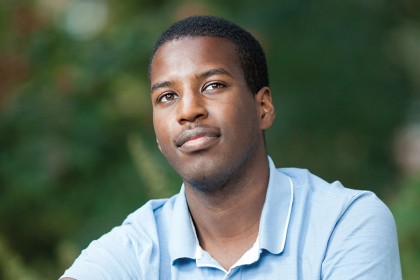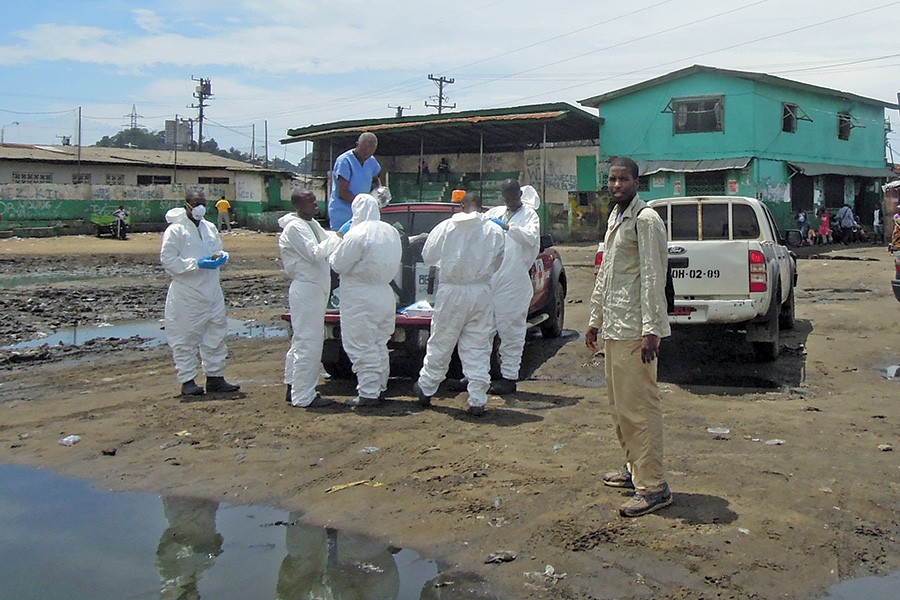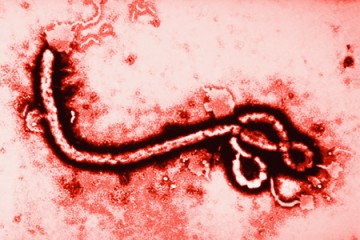In March, Logan Endow flew to Liberia on a one-way ticket to, in his words, follow a calling. But first, pause for context. This is pre–front page, Twitter-trending Liberia. A time when the West African nation's primary anxieties hinged on the lingering effects of 14 years of civil war (which claimed the lives of an estimated 250,000 people) and the subsequent political and economic upheaval—85 percent of the population lived below the international poverty line.

Image caption: Logan Endow
Image credit: JENNIFER BISHOP
These were the conditions the 23-year-old Baltimore-raised Quaker/Tibetan Buddhist expected as he sought to volunteer his services to the country's growing nonviolent social movement. Three years removed from earning a bachelor's degree in sociology from Stanford and months from starting a new academic journey at the Johns Hopkins School of Education, Endow had "free time" on his hands to pursue a passion.
He didn't know a soul there. Had no place to stay. Nobody expected his arrival. He thought he might reside in the country five or six weeks, or as long as a $5,000 loan lasted, or until he had to return to Baltimore for the start of the fall semester. Then one month turned to two. And then Ebola happened. A handful of cases at first, and then the word "epidemic" sputtered from people's lips.
Where many would have cut and run, Endow not only remained on foreign soil for five months, he would risk his life to become an integral cog in a nationwide effort to stem the spread of a virus that has killed thousands and threatens to kill many thousands more.
To those who know Endow, his fight-not-flight response comes as no surprise. Mature beyond his years, Endow appears bound to a higher calling. To get a sense of how he's wired, here's a young man whose idea of a good time is to audit violence prevention courses at the Bloomberg School of Public Health. In some respects, his involvement in Liberia seemed pre-ordained.
Endow grew up in the Northwood section of Baltimore, the son of a Senegalese father who immigrated to the United States in the 1980s. His father and mother met in New York and lived there for several years until they divorced and Endow and his younger sister moved to Baltimore with their mother, Karen Webber-Ndour, who is now executive director of student support for Baltimore City Public Schools. He attended Baltimore Polytechnic Institute, where he excelled academically and graduated a year early, and then enrolled at Stanford, earning a degree in just three years, at the age of 19.
At Stanford, Endow attended a lecture on compassionate activism given by a Tibetan monk, a talk that would reverberate in his head long after. After his sophomore year, he traveled to India to spend a summer learning more about Buddhism.
"Tibetan Buddhism has teachings passed down over hundreds and hundreds of years about the capacity of compassion for each human being. I don't think I would have done the work I've done in the past few years if I hadn't studied Tibetan Buddhism. It's one of the main drivers in the work I'm doing, and it shapes how I see violence. I see the potential for behavior change."
Following college, he interned at Google.org, the philanthropic arm of the Internet company, and then spent nearly a year traveling, first to Nepal to visit the monk he met at Stanford, then to Senegal to visit family, and then through Europe with friends, before returning to Baltimore. From June 2012 to June 2013, he worked in the Baltimore City Public Schools system on suspension issues. In an effort to reduce the number of suspensions, some Baltimore schools have adopted an after-school intervention program developed by the Holistic Life Foundation in which troubled students participate in meditation exercises as a way to cope with the traumatic stress they face daily. Endow calls the program a perfect match for his interests.
"I have a lot of mentors here in Baltimore who I owe everything to, those who helped me get into college. So I wanted to do something to give back and, more specifically, address violence prevention in schools, something we've struggled with for a long time," Endow says. "There is a definite connection between violence and low academic performance. Children act out, get suspended, and then miss valuable class time. It's not productive, and we're not addressing the problem. That is how I became interested in violence research at Johns Hopkins, especially the work of Tamar Mendelson."
It was Mendelson, an associate professor of mental health at the Bloomberg School and a member of the Johns Hopkins Center for the Prevention of Youth Violence, who encouraged Endow to pursue his interest in violence prevention, which prompted his travel to Liberia.
"As someone from Baltimore with experience in youth violence prevention, I was interested in Liberia's effort to reduce violence and scale up mental health programs for people who have had traumatic exposure to war," Endow says.
On the flight over, Endow asked a fellow passenger where he could find the cheapest hotel and was told the $30-a-day United Methodist Compound. The compound, it turned out, was next door to the Liberian headquarters of the Lutheran Church, which Endow knew had nonviolence programs.
He would subsequently walk in the door and introduce himself to the women-and-youth desk officer, a middle-aged woman named Vaiba Kebeh Flomo, a peace activist and one of the leaders of the nonviolence movement that led to a Nobel Prize for Leymah Gbowee. Endow calls the Lutheran Church a free-flowing place and just offered his services. He studied its mission and approaches and shadowed mental health workers, soaking up all he could. His supervisors eventually sent him to a Lutheran training institute for ex-combatants and child soldiers in northern Liberia's Zorzor district in Lofa County, a haven for war refugees. There he did more learning and absorbing.
In May, the Ebola outbreak had reached critical mass, and the institute shut down. Endow returned to the coastal city of Monrovia only to find the church-based nonviolence programs ground to a halt because of the outbreak and shortage of money. "Suddenly, everything got geared toward Ebola," Endow says. "If people were working on maternal and child health, they were suddenly working on Ebola. Trauma and healing programs got geared toward Ebola. Everyone dropped what they were doing to focus on this threat."
Endow, too, wanted to help, so he contacted the nation's assistant minister of health, Tolbert Nyenswah, an alumnus of the Bloomberg School of Public Health and the national incident manager of the country's Ebola response.
Nyenswah asked Endow if he wanted to join the national task force on Ebola response, and he agreed. He went to morning meetings with Nyenswah and other health ministry officials and spent afternoons in towns such as Caldwell and New Kru Town, where the outbreak had started. "The minister told me to just come out and make an impact somehow," Endow says. "He said he wasn't going to micromanage me—just learn, listen, and then do what you can."
By July, the Ebola response had ramped up and a nongovernmental organization took over contact tracing for the capital region, which meant tracking down friends, family, colleagues, health care workers, and anyone else who had come into contact with an infected individual. Endow became part of the tracing team while still doing Ebola awareness on behalf of the Lutheran Church.
Back home, he says, his mother worried, but he assured her in phone conversations that he would be safe and needed to stay. "I wanted to see the realities on the frontlines," he says. "I thought I could help."
As a tracer, he met family members of those who had died and friends of infected people who were now burdened with the stigma of having been in contact with someone with the highly contagious virus. Tracers typically deal with 10 contacts for an Ebola case. They go from home to home to offer support and see if anyone is getting sick. Anyone who comes into contact with a case needs to be followed for 21 days, the period during which symptoms such as fever, vomiting, and unexplained bleeding would occur.
At first, Endow was put in charge of collecting data on the number of contacts in cases. He then got paired with Harriet Togba, director of psychosocial services for the capital region, to go out into the field and supervise six health zones that covered a population area of more than a quarter million people. Each zone has a supervisor who oversees contact tracers, and Endow and Togba made sure they were doing their jobs.
"We had to visit each zone supervisor each day, including weekends and holidays, to make sure the work was happening and the contacts were being followed up on," he says.
Endow says at no time did he doubt his abilities or question why he was given such authority. "I think the minister wanted to give people a chance to prove himself or herself," Endow says. "He would choose people who he trusted and he knew would do the work every single day. I guess he thought I could be trusted."
In terms of respect, Endow says he earned that by going out in the field each day, which meant putting his life at risk.
"All of our lives were at risk, so we gained a mutual respect for each other," he says. "There were some tensions, sure, but not because I was young or an American. People were just agitated with each other because of the circumstances. But I never felt tension because of my age or where I was from. Actually, the main concern for us wasn't catching Ebola; it was community resistance and violence. The challenge was getting the truth from people and making sure we had the full and complete information."
He admits to being afraid, but he says that when you're in the middle of such a calamity, you learn quickly to be emotionally detached. In the field, he took precautions such as wearing long-sleeved shirts, and he made sure not to directly touch anyone who might be infected. The bigger worry, he says, was that all the major hospitals and many health clinics had closed because nurses and doctors were afraid to come to work.
"So, at that time, all of us got worried because what happens if we get malaria, or in a car accident. You're kind of out of luck," he says. "That was the thing. We saw people dying of common diseases and injuries because the hospitals were closed." Nyenswah says that Endow displayed the courage and discretion necessary to combat such an epidemic.
"When you look Logan in the eye, it's clear that he's not afraid of much," Nyenswah says. "He has gone into some of Liberia's most violent communities, unarmed, in order to combat Ebola."
As the summer dragged on, the number of Ebola cases doubled every two weeks in the capital region. More than 15 health care workers became infected at a nearby Catholic hospital.
A chapter of Doctors Without Borders built a 150-bed center in Monrovia—at the time, the largest Ebola center ever built. Soon after, a 400-bed center followed. Endow visited the center to see how it was run.
"I went there and talked to one of the guys and he says nobody in the world really has the experience and training for this. It's going to be a learning experience. But you know what, we need thousands of beds. Thousands. Now it's like, what do we do?"
By late October, the World Health Organization had reported nearly 9,000 cases and 5,000 deaths from the Ebola virus in seven countries. The outbreak—centered in the West African nations of Liberia, Sierra Leone, and Guinea—had rapidly become a public health crisis, with the CDC estimating that 1.4 million could become infected in Liberia and Sierra Leone by January.
In the field, Endow saw people in the early stages of Ebola, dead bodies, and people literally dying on the road. Every day brought news of another case.
Eventually, the numbers began to overwhelm the tracer teams.
"Early on there were only so many cases, and we could follow the storylines: OK, this person came from Sierra Leone and they got sick. But after a while, you can't keep up with the connections. It's complete confusion," he says. "For many of us, this period was one of frustration. The expectations of when this would be over just kept moving back. First they said six months. Then nine months. Then 12 to 18 months. How do we have a grand strategy that can solve this problem?"
Endow says that nations like Liberia were somewhat prepared for outbreaks in rural areas, where they had hotlines and could isolate cases, but in places like urban Monrovia, you need active surveillance and door-to-door awareness building and case finding. "If that had been put in place earlier, a lot of this situation would have been averted, I feel," he says.
Endow describes his last few days in Monrovia as hectic and heartbreaking. A 22-year-old nurse, whom he had come to know well, got sick and walked himself to a clinic. He later died. The entire Monrovia community of West Point (population 75,000) was put under military quarantine.
He was supposed to leave Aug. 1 but pushed back the date as far as he could. By late August, he says, he was ready to return home.
"I felt I needed to recharge and get more perspective on the problem before I could work on it more," says Endow, who wants to return to Liberia in December during winter break, although recently announced university travel policies might prohibit that. Endow says he feels that he made some impact while he was there, but he has more to give. "I was unhappy to leave because it still wasn't over," he says. "Looking back, I think I helped the families of patients I came into contact with, consoling them and helping them deal with this very difficult situation. I'm also proud of the door-to-door active awareness campaign I did for my community of Rock Hill and this area known as West Point, one of the more violent areas of the city. There we discovered a case, and that helped uncover how many total cases were in the neighborhood. So there were moments of victory."
Speaking from her home in Liberia, Flomo says that Endow showed "great compassion" for the people of her community, and became a trusted colleague in the effort to mitigate the outbreak.
"We did a lot of very good work together. Sometimes, we would just sit around and strategize, asking, what do we do next?" says Flomo, who invited Endow to move in with her family and keeps in regular contact with him. "He came to learn from us, and he did. But we also learned from him."
Now back in Baltimore, Endow has begun classes at the School of Education, where he is enrolled in the one-year master's program on counseling. He says he wants to become a practicing counselor but also has thoughts of obtaining a degree in public health, likely focused on epidemiology.
Mary Ellen Beaty-O'Ferral, an associate professor at the School of Education and Endow's mentor, says that Endow could do anything he puts his mind to. She describes Endow as an exceptional student and person who immediately made a big impression on her and school colleagues.
"Here is this fearless kid, just so mature and independent and unlike anyone I've ever met. I mean, who finishes Stanford in three years and then goes off to study with monks in Tibet?" Beaty-O'Ferral says. "There is just something very peaceful about Logan despite all the violence and sadness he's witnessed. I know this isn't a fair comparison, but his demeanor reminds me of Nelson Mandela."
Endow keeps in contact with colleagues back in Monrovia to assess the latest news from their perspective. In addition to his classwork, he says he wants to work for Lutheran World Relief, which is based in Baltimore, and plans to meet with professors in the Bloomberg School to help gain a better understanding of the broader Ebola strategy. "How was the outbreak in Uganda prevented? How did the outbreak in the Congo not ramp up to this level? I feel like now I have time to get more grounded in the problem," he says.
This busy student may not have much time at his disposal, but he'll make some.









